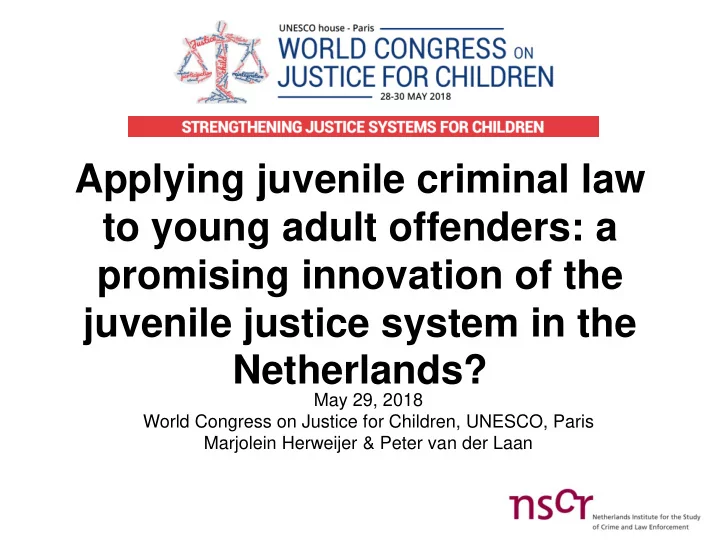

Applying juvenile criminal law to young adult offenders: a promising innovation of the juvenile justice system in the Netherlands? May 29, 2018 World Congress on Justice for Children, UNESCO, Paris Marjolein Herweijer & Peter van der Laan
Young-adult criminal law Young adult criminal law (Yacl) in The Netherlands 1. What is the Yacl? 2. Why do we have a Yacl? 3. First outcomes 4. Possible explanations
1. The Young adult criminal law • Dutch criminal law - Juvenile criminal law 12-18 - Adult criminal law > 18 • Juvenile law - Possibility to try and sentence 16 & 17 year olds as adults - Possibility to try and sentence young adults 18-21 years as juveniles
1. The Young adult criminal law • YACL: since April 1st 2014 possibility to try and sentence young-adults aged 18-23 as juveniles • The rationale behind the Yacl: some young adults are better off sentenced as a juvenile because of their ‘unfinished development’ • Juvenile law sanctions have a pedagogical notion
1. The Young adult criminal law • Which young-adults are better off? Young adults with problems with their emotional, social, moral and intellectual development such as: - young adults that have committed severe crimes - young adult repeat offenders - young adults with a psychological or psychiatric disorder - young adults with a developmental disorder • No clear legal description
1. The Young adult criminal law • The YACL aims to increase the attention for the developmental phase in the reports by psychiatrists and psychologists of the suspect/ offender in order to allow the judge to take this into account when sentencing • The YACL aims to encourage young-adult offenders to take up a responsible role in society (resocialisation) and to desist from committing crimes (decrease recidivism)
2. Why do we have a Yacl? • New scientific insights in the psychological and neurobiological development of young-adult offenders • Moffitt (1993) dichotomy in criminal carriers: the adolescent-limited and the life-course persistent group. The first group only displays criminal behaviour during adolescence. Whereas the life- course persistent group starts criminal behaviour early and continues this behaviour after adolescence
2. Why do we have a Yacl?
2. Why do we have a Yacl? • The biopsychosocial development of individuals continues until at least their mid-twenties • The decision process during adolescence and young adulthood differs from that during childhood and adult life Adolescents and young adults do not always have adequate impulse control. Young adults are more sensitive to external influences, including the influence of peers • Adolescents are less able to judge and make decisions about actions that have consequences for the future • Research suggests that young adults that persist in a criminal career have an immature (or unfinished) psychosocial development with regard to functions that are relevant for persisting in crime
2. Why do we have a Yacl? • Neuroscientific research on delinquent behavior • Adolescence and early adulthood are periods when the brain undergoes a substantial development in which structural changes of the brain take place and changes occur in how the brain works • Specific risky behavior, which often occurs between the ages of 15 and 23 in adolescents, is caused by the incomplete development of certain important brain functions
3. First outcomes • Number of convicted young adult offenders dropped: - 2012: 29.320 - 2014: 25.350 - 2016: 21.390 • Young-adults (18-23) tried and sentenced as juvenile increased but minimal: - 2012: 1-2% - 2014: 3% - 2016: 5%
3. First outcomes
3. First outcomes • In practice: young adult offenders of severe crimes, with developmental disorder and with psychological or psychiatric disorders are tried and sentenced as juvenile since 2014 • Still too early to draw conclusions
3. First outcomes Questions remained unanswered: - Why are still so few young adults tried and sentenced as a juvenile? - How can this number be increased? - For which group of young adults would it be best? - Is this group being tried and sentenced as a juvenile? Or do we miss types of young adults?
4.Possible explanations - No legal definition - Main rule: adult criminal law unless ….. - Complication: decreasing crime rates - Prosecutors not yet fully aware of possibilities
Recommend
More recommend